Are Mission Trips Effective?
"I have seen with my own eyes or know of houses in Latin America that have been painted 20 times by 20 different short-term teams . . ."
The first #GO equipping workshop: How to Lead a Mission Trip Effectively launched on 1 February 2024 with more than 50 people joining us. Ms Wang Bixia (Cru Singapore) started off the workshop quoting the above from an article by The Gospel Coalition "Why You Should Consider Canceling Your Short-Term Mission Trips".
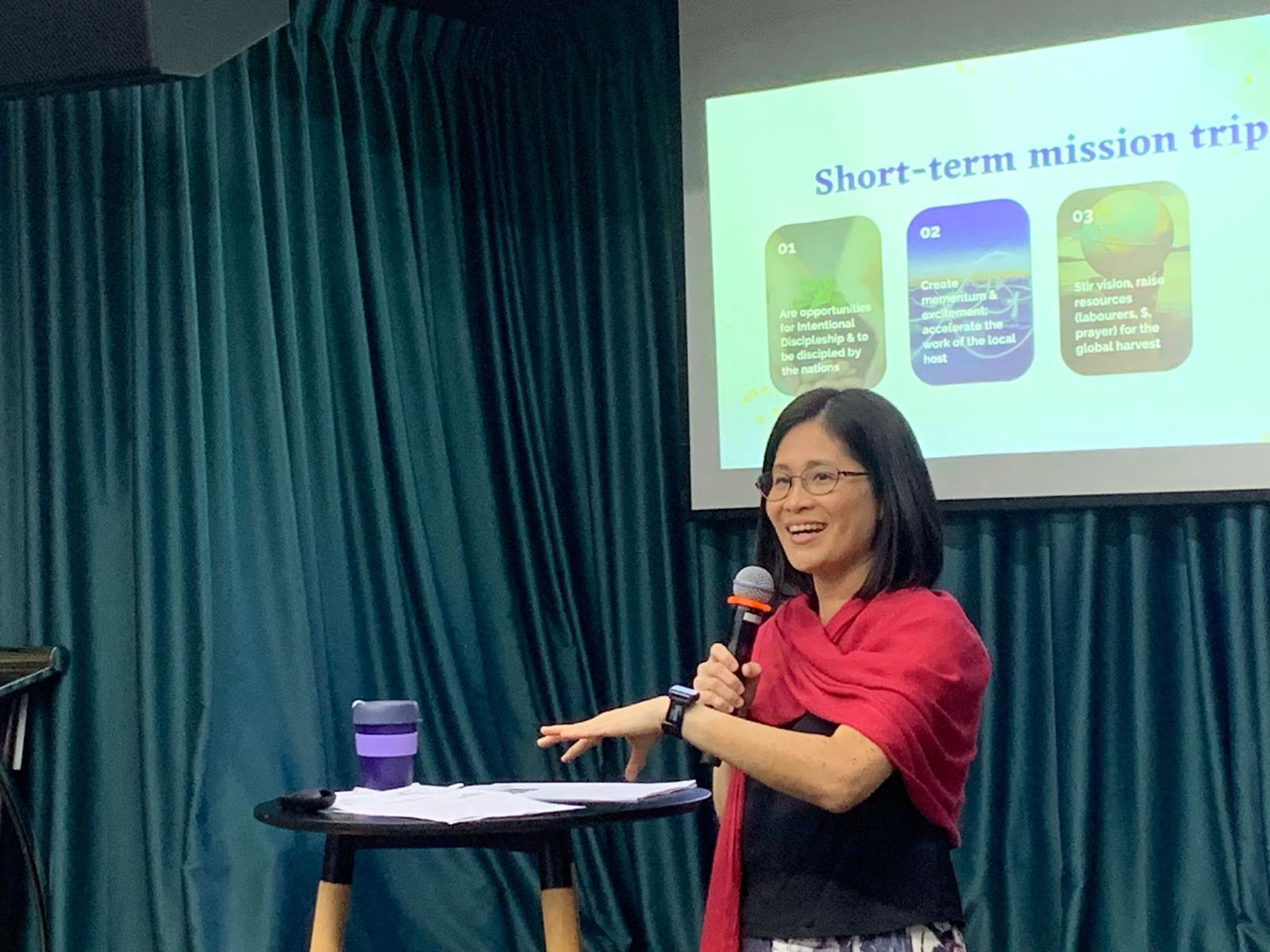
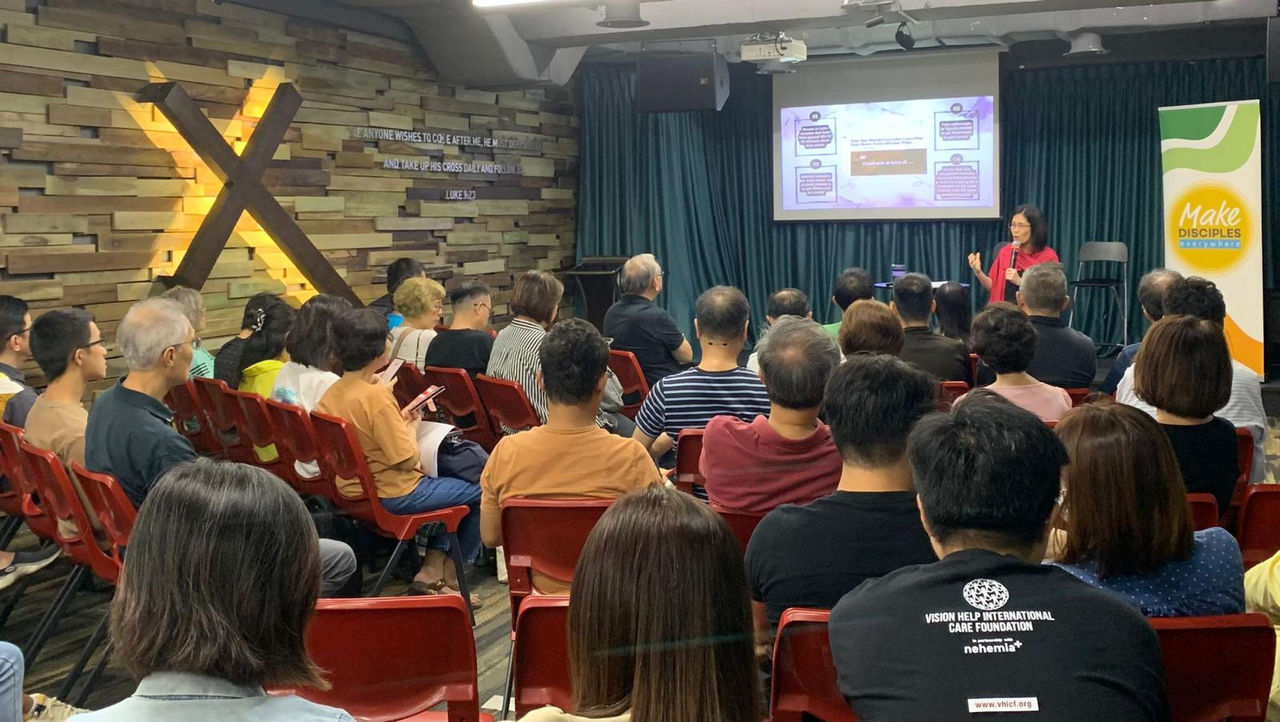
How about you? Do you think mission trips should be cancelled?
Sometimes we can be too eager to help—presumptuous of what the local host needs and how we can contribute.
Missionaries may get numerous requests to visit from well-meaning supporters or church members, and find themselves busy with being tour guides or translators instead of their main ministry of disciple-making. Despite spending so much time and effort, they end up not receiving much help or leverage for their long-term work there.
So, are all short-term mission trips ineffective?
No. The key lies in your intentionality. There are real needs and good reasons for sending short-term mission trips, but we need to be more intentional to make sure they are effective.
In short, short-term mission trips . . .
In fact, being involved in the Great Commission is really not an option for a follower of Christ; the only question is how, and where we should be a part of it.
How then, should we conduct our mission trips for them to be more effective & fruitful? (Disclaimer: due to limited time of the workshop, the points listed here are not exhaustive.)
YOUR POSTURE MATTERS
a. Be There to Serve
i. Besides logistical questions, ask the host more strategic questions to find out how you can better serve, e.g. optimal mission team size, dates and duration, tripper profile to match with the local ministry opportunities.
If the host hosted mission teams before yours, glean from their experiences to see what works. There’s no need to reinvent the wheel.
ii. Together with the host, discuss and determine trip objectives and outcomes.
iii. Jesus not only gave the Great Commission, He also gave the Great Commandment (John 13:34-35). Remember to love and serve one another in the mission team, so that others will see that you are Christ's disciples through the way you relate with each other.
b. Be a Learner
i. Be aware of your own biases and learn to respect cross-cultural differences—at times, it’s not wrong, it’s just different.
Read this article to explore some of the differences across various cultures. However, do note that the listed profiles reflect the value systems of a society at large. We should be careful not to make assumptions about someone’s personality or working style which may be very different from others in his/her home culture.
ii. Particularly in creative access countries—where there is no freedom of worship or where the gospel may not be openly proclaimed—we want to conduct ourselves in a manner that’s culturally appropriate (dressing, behaviour, ministry approaches, etc.) and won’t undermine the gospel or expose the hosting church or ministry to unnecessary risk.
iii. Have a cross-cultural training or orientation before you go or upon arrival at the destination.
2. PREPARING WELL
a. Manage the Expectations, Energy and Morale
A mission trip involves adapting not only to a new country and culture but also to the dynamics of living, working, and ministering with your team. Considering the trip objectives and desired outcomes, manage your mission team’s expectations, energy and morale in light of these factors below:
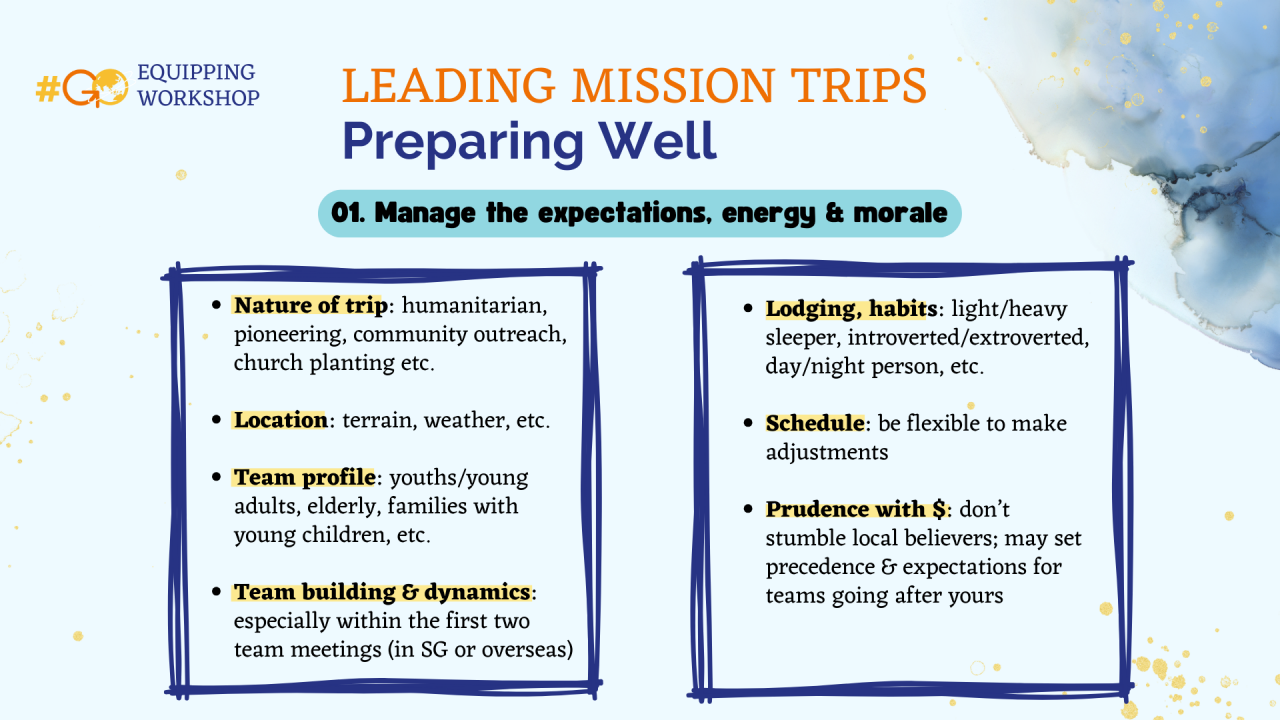
b. Be Prepared for Crisis
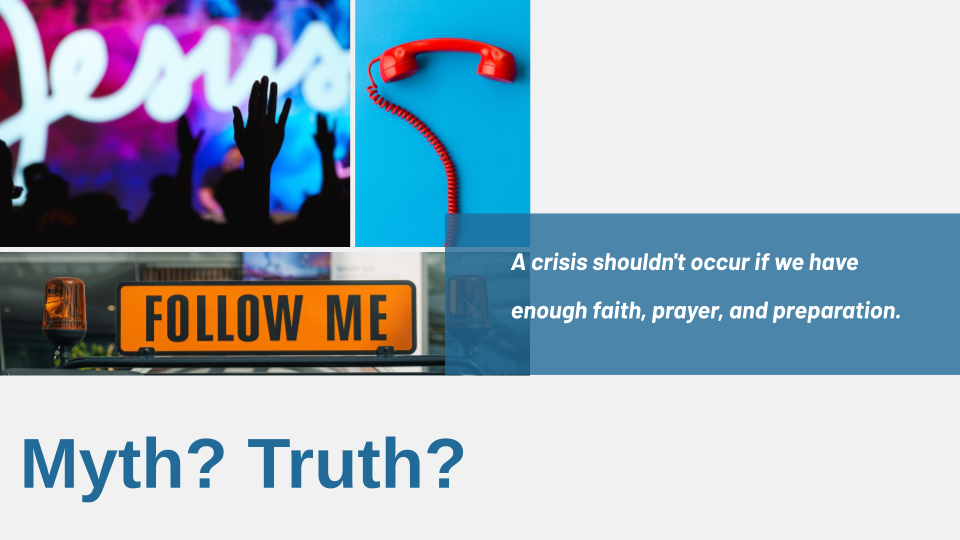
Does faith exempt us from crises?
On the contrary. In the Bible, we read of men of faith like Paul and Barnabas meeting with crises. Paul was stoned, shipwrecked, and even parted ways with Barnabas after having a dispute over John Mark.
“Aiya, don’t need to worry. If there’s a crisis, the local host will know what to do.”
Not necessarily. Remember that you and your team are foreigners—what’s relevant for locals may not apply to us. For instance, some hospitals may not be equipped to treat foreigners.
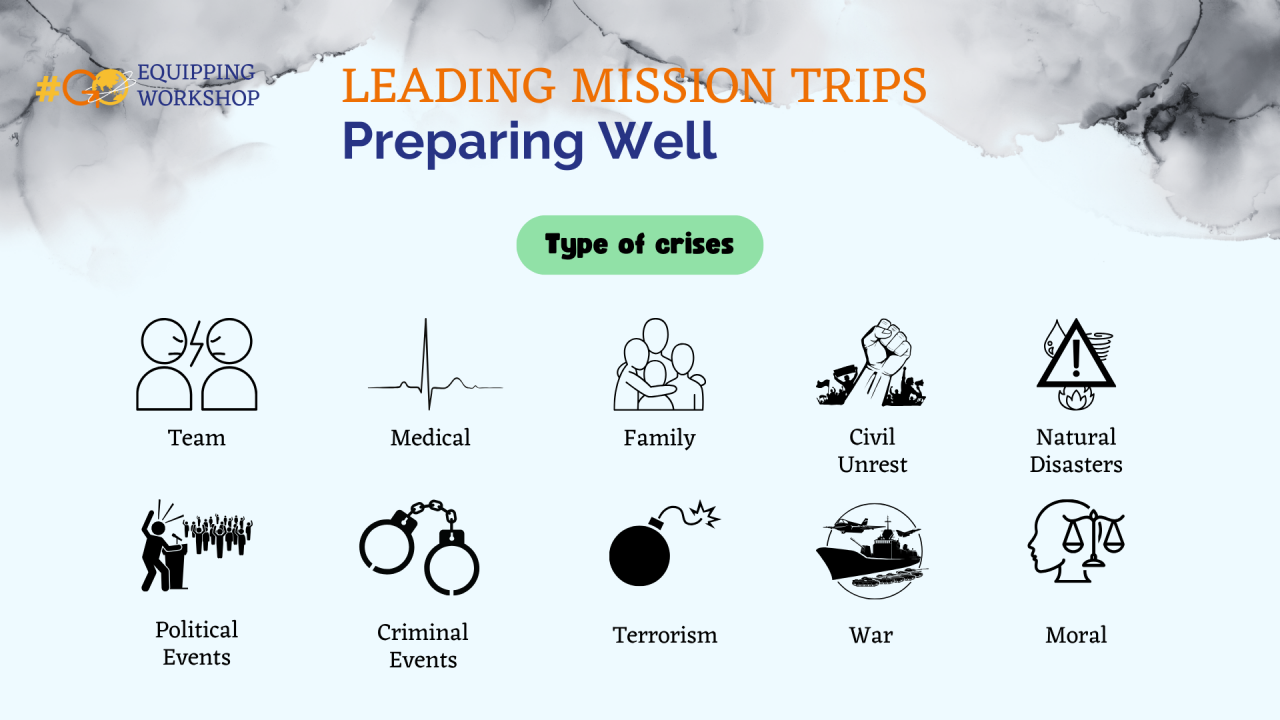
With so many possible crises, how do you go about preparing for them? We recommend at least the following:
i. Seek out news related to the location and timeframe of your mission trip. Pay attention to travel advisories by the Ministry of Foreign Affairs.
ii. Prepare useful information to be ready at hand:
- Host & team members information
- Emergency contacts (next-of-kin)
- Travel insurance emergency hotline
- Nearest hospital that treats foreigners/pharmacy
- Nearest Singapore embassy/consular
- Air ticket, passport copy, etc.
iii. Understand the crisis protocol (if any).
c. Have Clear Roles on the Team
Some roles that you can distribute amongst your mission team members are, administrator, first aider, event coordinator, etc.
At the same time, be clear of your role as a team leader, and where you spend your time and energy. You should:
i. Appoint an assistant team leader to lead together, and take over when needed (e.g. when you fall ill and become out of action).
ii. Liaise and evaluate with the host, and make mid-course adjustments where necessary.
iii. Lead the team and help resolve conflicts.
iv. Intentionally disciple team members.
3. INTENTIONAL DISCIPLESHIP
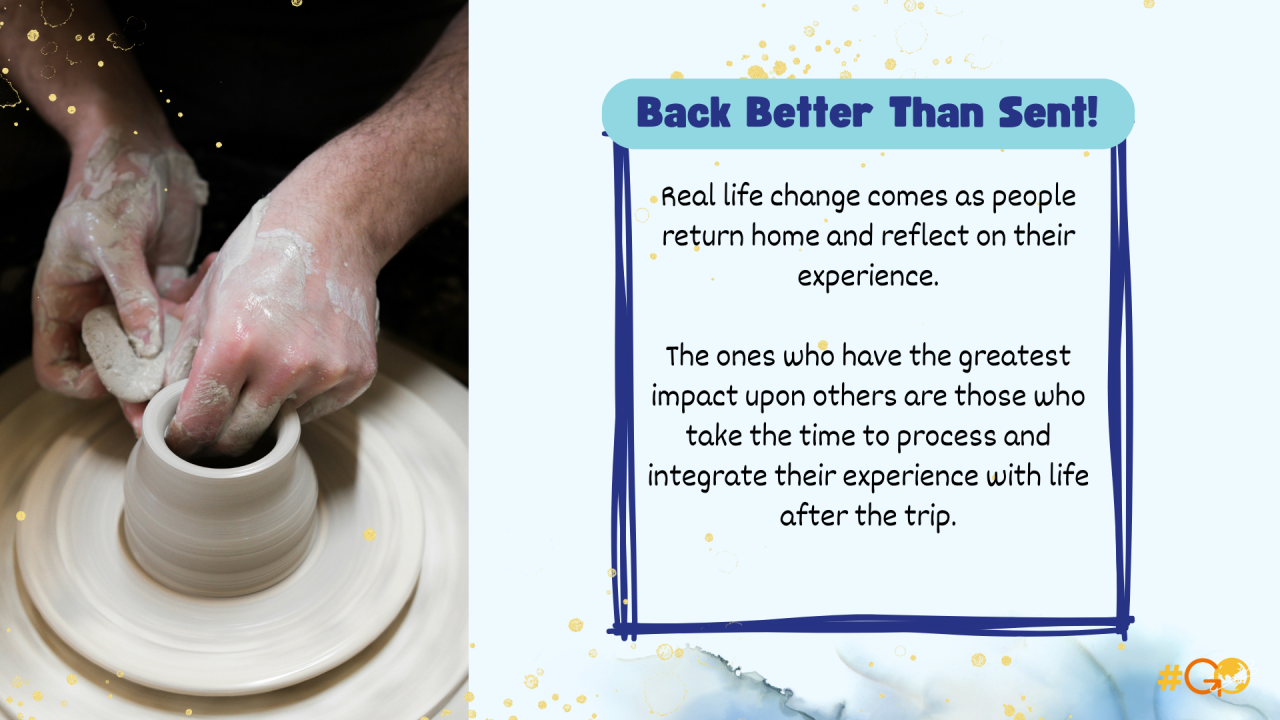
Photo by Courtney Cook on Unsplash
As Rev Edmund Chan, Leadership Mentor of Covenant Evangelical Free Church, puts it, "Truth doesn't change lives. Truth applied changes lives."
Or as the Apostle Paul puts it, "I planted, Apollos watered, but God was causing the growth." (1 Cor. 3:6 NASB)
Pre-trip training and preparation, on-field intentional discipleship, and post-field debriefing are all essential parts of the growth process on a mission trip.
That’s why a key focus of our mission trips should be Intentional Discipleship.
How do you do that?
a. Pay Attention to God’s Discipleship Agenda
i. Make space in the team’s schedule for mutual learning, fellowship, and encouragement. Include a mid-trip or post-trip reflection or retreat session for team members to contemplate on lessons learned.
ii. Include meaningful cross-cultural exposure during the trip—there’s so much to learn about other cultures during mission trips! You can consider creatively including this aspect in a cultural orientation or a prayer walk at the beginning of the trip.
iii. Help members expand their circle of confidence by doing ministry together and giving them key developmental assignments. Intentionally pair those who are younger in their faith with those who are more mature, or those who are trying their hands at sharing their faith or having spiritual conversations with those who’re more experienced.
iv. Address negative attitudes or behaviours of team members, e.g. when the member is not fulfilling his/her assigned role or involved in a conflict with another person.
b. Debrief and Closure
i. Process individually and as a team, to glean from and internalise experiences. Some mission trips leave team members overwhelmed by the wide range of new experiences. The hectic schedule and flurry of activity make it difficult to sort through the events that God is using to initiate lasting spiritual change within us. No matter how many times one has been involved in cross-cultural ministry, careful evaluation and meditation is necessary to fully process the events experienced.
ii. Prepare for re-entry to Singapore. A few weeks of immersion in a foreign culture might have changed you, and you find yourself responding to everyday occurrences in ways you never responded before. Reflecting on how your perspectives have changed would be beneficial for overcoming any re-entry shock you may encounter.
iii. Do a proper evaluation and handover with, and appreciate the local host. For example, you can prepare cards and small gifts for the hosting church or ministry to follow up with key contacts like new believers and people who are interested to find out more about the faith.
c. Cast Vision for the Global Harvest
Invite the host to cast a vision and share their needs for labourers, resources, challenges, etc.

Photo by Anne Nygård on Unsplash
d. Call to Action
Consider challenging your team members to:
a. Return to the same destination for another short-term mission trip or a one to two-year stint
b. Keep in touch with local believers (if possible)
c. Continue supporting the hosting church or ministry in prayer and finances
d. Help raise awareness and labourers to go
e. Get involved with serving among the same people group here in Singapore
Here’s an open invitation for you: #GO lead a mission trip this year, implement the points mentioned above, and see how mission trips can be effective in meeting real needs of the mission field, fueling growth in mission team members, and accelerating the spread of the gospel around the world!
Wang Bixia
Cluster Lead, Leadership Development and Human Resource
In her 24 years with Cru, Bixia has mobilised and led many mission trips, including coaching student teams while serving in Campus Ministry, and spearheading a one-year missions campaign to Taiwan in 2014 while heading the Missions Department.
“Back better than sent” is Bixia’s mantra—to see mission trippers grow their faith in the mission field and return home better than before.

©1972-2025 Cru Singapore. All Rights Reserved.